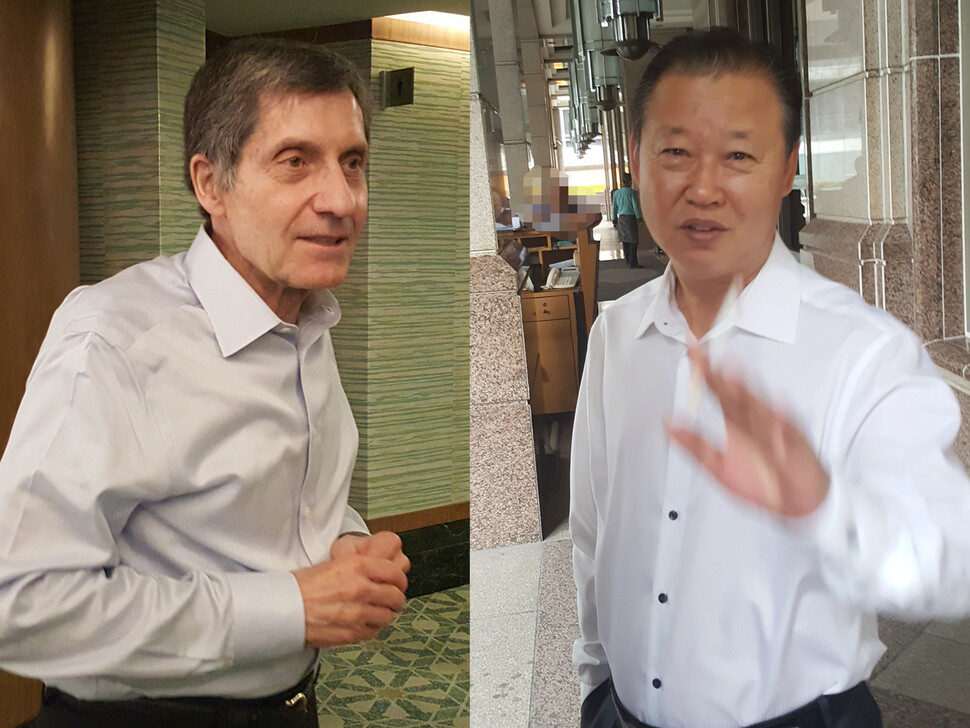hankyoreh
Links to other country sites 다른 나라 사이트 링크
North Korea and the US conclude informal meetings in Malaysia

North Korean deputy foreign minister Han Song-ryol headed home after behind-the-scene meetings in Kuala Lumpur on Oct. 21-22 with Robert Gallucci, the US State Department’s special envoy on the North Korean nuclear issue.
Han strongly hinted the dialogue was of an “exploratory” nature ahead of the arrival of a new US administration following the Nov. 8 presidential election.
“We are exchanging views on issues of interest,” he said.
Leon Sigal, director of the Social Science Research Council‘s Northeast Asia Cooperative Security Project, told Yonhap News the two sides focused on the North Korean nuclear and missile issues, adding that he felt some progress had been made.
The South Korean Ministry of Foreign Affairs was dismissive of the encounter in remarks on Oct. 23.
“The US government has explained that these discussions have no connection whatsoever with it,” it said.
In a somewhat testy response, the ministry also said, “The fact that North Korea sends sitting officials even to Track II (civilian) meetings is evidence of its diplomatic isolation as a result of unprecedented sanctions and pressure from the international community.”
“South Korea and the US will continue imposing forceful sanctions and pressure on North Korea,” it asserted.
In contrast with other forms of Track II dialogue between North Korea and the US, which typically take the form of academic conferences, the meeting consisted entirely of bilateral encounters, with veteran participants who are well acquainted with each other. The five representatives from the North Korean side included Han, who is seen as one of the Foreign Ministry’s leading US experts, and deputy UN ambassador Jang Il-hun. On the US side, a number of former officials and experts attended, including Gallucci - a pivotal figure in the 1994 Agreed Framework reached by North Korea and the US in Geneva - and Joseph Detrani, former director of the National Counterproliferation Center for the US Director of National Intelligence (DNI).
Sources said the US attendees were not assigned any authority to negotiate by the Barack Obama administration or by the camp of Democratic presidential candidate Hillary Clinton, who is likely to win the election next month.
“Clinton’s camp is still pretty cautious about direct contact with North Korea,” said one expert, adding that Gallucci and other attendees would “try to influence the next administration’s Korean Peninsula policy planning by communicating the outcome of these discussions to the transition team once the election is over.”
Indeed, Sigal commented that the next administration would need to “reconsider” its North Korea policy.
“As figures outside the government, we are working to find relevant areas where we can make suggestions to the next administration,” he said.
By Lee Je-hun, staff reporter
Please direct questions or comments to [english@hani.co.kr]

Editorial・opinion
![[Editorial] Yoon must halt procurement of SM-3 interceptor missiles [Editorial] Yoon must halt procurement of SM-3 interceptor missiles](https://flexible.img.hani.co.kr/flexible/normal/500/300/imgdb/child/2024/0501/17145495551605_1717145495195344.jpg) [Editorial] Yoon must halt procurement of SM-3 interceptor missiles
[Editorial] Yoon must halt procurement of SM-3 interceptor missiles![[Guest essay] Maybe Korea’s rapid population decline is an opportunity, not a crisis [Guest essay] Maybe Korea’s rapid population decline is an opportunity, not a crisis](https://flexible.img.hani.co.kr/flexible/normal/500/300/imgdb/original/2024/0430/9417144634983596.jpg) [Guest essay] Maybe Korea’s rapid population decline is an opportunity, not a crisis
[Guest essay] Maybe Korea’s rapid population decline is an opportunity, not a crisis- [Column] Can Yoon steer diplomacy with Russia, China back on track?
- [Column] Season 2 of special prosecutor probe may be coming to Korea soon
- [Column] Park Geun-hye déjà vu in Yoon Suk-yeol
- [Editorial] New weight of N. Korea’s nuclear threats makes dialogue all the more urgent
- [Guest essay] The real reason Korea’s new right wants to dub Rhee a founding father
- [Column] ‘Choson’: Is it time we start referring to N. Korea in its own terms?
- [Editorial] Japan’s rewriting of history with Korea has gone too far
- [Column] The president’s questionable capacity for dialogue
Most viewed articles
- 1Months and months of overdue wages are pushing migrant workers in Korea into debt
- 2At heart of West’s handwringing over Chinese ‘overcapacity,’ a battle to lead key future industries
- 3Seoul getting its first-ever vertical farm
- 4Fruitless Yoon-Lee summit inflames partisan tensions in Korea
- 5Trump asks why US would defend Korea, hints at hiking Seoul’s defense cost burden
- 6[Editorial] Yoon must halt procurement of SM-3 interceptor missiles
- 7[Editorial] New weight of N. Korea’s nuclear threats makes dialogue all the more urgent
- 8Dermatology, plastic surgery drove record medical tourism to Korea in 2023
- 9Under conservative chief, Korea’s TRC brands teenage wartime massacre victims as traitors
- 10Gangnam murderer says he killed “because women have always ignored me”